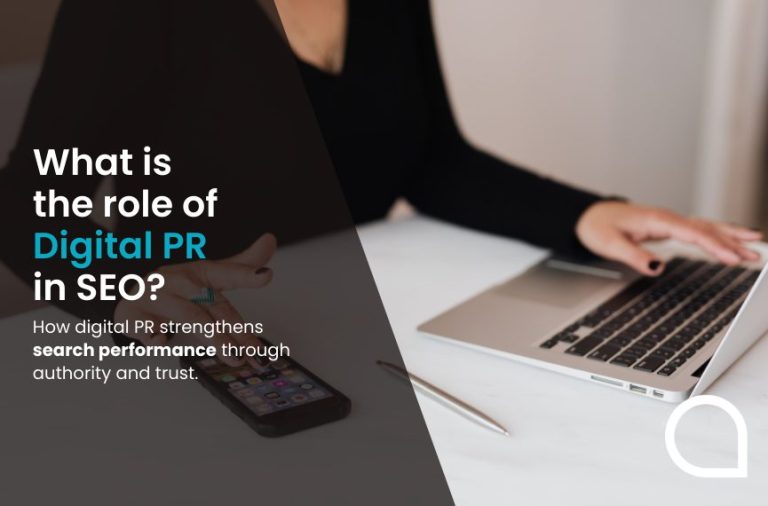
How can digital PR help my company grow?
Struggling to unlock the full potential of your business and kickstart growth? Public Relations (PR) could be the key. Often used to build a positive
Local SEO, like SEO in general, can be deceptive. In search engine optimisation, people tend to think the sole area of focus should be on creating content and using keywords strategically. However, local SEO is really about a multi-faceted approach, in which various elements all need to come together.
Therefore, if you want to know how to boost your local SEO, you need to look at all the factors that will influence your Google ranking. Think of local SEO not as a single strategy, but rather a collection of different ones, all working towards the same objective.
These strategies include:
For local SEO to be effective, you need to establish a local presence. By opening a Google My Business account you can optimise your business profile on Google. Your business profile helps you gain visibility on Google, and the information you provide via your Google My Business account dashboard will appear in local search results.
It’ll also be in Google Maps and Google’s knowledge panels – the information that appears in boxes when you search for something.
What sort of information do you need to provide for your business profile?
Accurate and up to date information, obviously. But also content such as product launch details or special offers. And encourage your customers to leave reviews, which you should then respond to.
Customer reviews provide the social proof your business needs to attract more interest and optimise it for local SEO. 90 per cent of UK consumers check online reviews first before buying from a business. Many people treat online reviews as personal recommendations. They’re a key means of building trust with your audience.
Important review factors for users include:
Best SEO practice isn’t just about what questions people are asking but also how they ask them. Voice search is growing rapidly, so you should optimise your content for this.
This may require some adjustments. How people talk is more conversational, and, typically, involves more long-tail keywords. Voice searches tend to focus on requests for specific pieces of information.
Google prioritises the mobile version of your content for indexing and ranking purposes. Most users do their searches on mobile devices, and this includes local searches. It follows then, that if you’re optimising for local SEO, you need to optimise for mobile.
Major factors you should consider are:
If you’re developing a local SEO strategy, then you should also consider tailoring your content for greater local relevance. Addressing local issues directly is a great way of grabbing the attention of local customers.
This content can be in the form of blogs or videos, and you might focus on local charity events or news stories. You could also set up location-specific web pages on your site if there are different parts of a region you want to serve.
Local keywords should be relevant to local customers. If you use the Keyword Planner tool Google, it will filter keywords based on location. This should give you a good idea of what keywords are popular in searches in a specific region.
From this information, you can create a list of locally relevant keywords to target.
Use these local keywords in your:
You can also be more obvious in your targeting and include local places of interest, venues and references in your copy.
These are essential if you’ve got more than one business location and you want to provide specific customer information about each one. This information can include opening hours, local offers and promotions and testimonials.
Be sure to attach Google maps to each location-specific page.
Local SEO isn’t just about the content you create for your own website. Another useful piece of collateral is to get your details into online directories that list local businesses. An obvious example is Yell.com (Yellow Pages) but there are plenty of others.
Provide contact details, a description of your business and a backlink to your website. Make sure all your information on local business directories is consistent, and if anything changes, update all your entries.
If you’re going to harness the power of local SEO to grow your business, you need to look at it from multiple angles.
And you have to commit to managing this process and keeping your SEO strategy up-to-date.
Aqueous Digital are your local SEO experts. We can create an effective local SEO approach as part of a broader SEO strategy.
As an award-winning digital agency, we have the skills, expertise and experience to ensure that your business enjoys the benefits that an intelligent local SEO strategy can bring.
Take a look at the SEO Services we offer and get in touch on 0800 285 1424 or email agency@aqueous-digital.co.uk for an initial discussion and a free consultation.
Aqueous Digital’s Guide to the Top 501 SEO and Digital Marketing Terms
Aqueous Digital’s Beginners Guide to SEO
How out carry out an in-depth Technical SEO Audit
Aqueous Digital’s Ultimate Guide to the cost of SEO in the UK
How long does SEO take to work?
What are the most important SEO ranking factors?

Struggling to unlock the full potential of your business and kickstart growth? Public Relations (PR) could be the key. Often used to build a positive

Weighing up whether your business should invest in marketing or public relations (PR)? As seasoned digital PR and marketing professionals, the expert team at Aqueous

Digital public relations (better known as just digital PR) is quickly becoming an essential instrument in the modern marketers’ toolkit. As Google’s algorithms evolve and

There’s something about machine-written content that just doesn’t sit right with us. And it’s not just the written word either. Take Coca Cola’s latest Christmas

The way people find information online is evolving, and quickly. Artificial intelligence (AI), whether that’s applied generatively through tools like ChatGPT or in response to

On October 10 2025, the UK’s Competition and Markets Authority (CMA) announced that Google had been granted strategic market status (SMS) in search services. Why